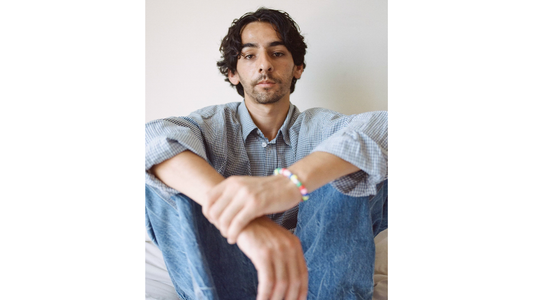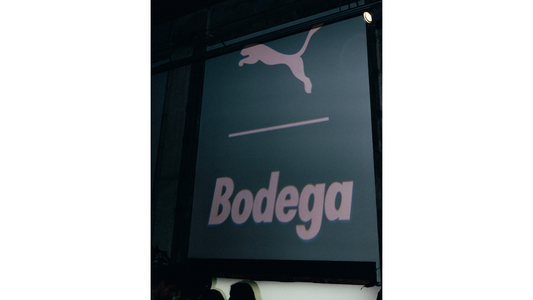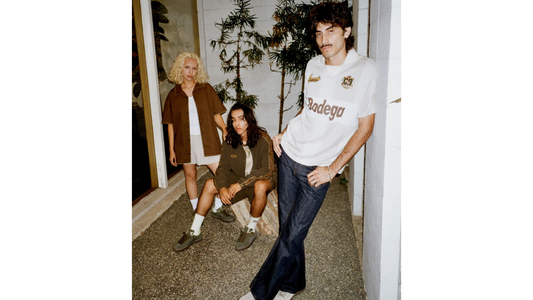Perhaps best known as the front man of legendary punk band Ceremony, Ross Farrar's interests inside and outside of music spans far greater than the California HC scene where he learned the ropes. From exploring other projects like Spice and his solo work to the urge to dive back into academia and study poetry, Ross's evolution has been exciting to follow and we can't wait to see what's next. But in the mean time, check out our latest Pirate Radio Mix to hear his eclectic taste in action and read our interview with him below.
Q&A w/ Ross Farrar
B: Before we get into the QA itself, can you talk about the Pirate Radio mix you made for us!?
R: These were songs I choose to play at a DJ night for an afterparty at the Power Trip gig in Dallas, TX. My bandmates got up into the DJ booth and started playing songs that made people groove, took one look at this list and decided not to play a single track, regardless of Colourbox being a certified CLUB BANGER. But Joke’s on them. These are all songs that’ve been in heavy rotation as of recently and will continue to be in my life and hopefully yours too. The first track, Eden Ahbez’s “Full Moon” is the walk-up track for SPICE. We’d turn the lights down low, disco ball on, and blast that one in hopes of setting the mood. Aldous Harding’s latest record is amazing, a brand-new band out of LA called Romeos and some classics: Roy Ayers, Beatles, The Fall, etc. I could take several pages talking about each song but will spare you all. And shout out to BOSTON with that Ultimate Spinach track.
B: What was your introduction to music as a kid growing up in California?
R: I got into hip-hop first. We’d skate EMB on Friday nights and mostly what was in my Walkman was east/west coast hip-hop: The Pharcyde, Mystic Journeymen, Tribe, De La and so on. First tape I ever bought was Ghostface Killah’s Iron Man to give you an idea.
B: Did you gravitate toward the Bay Area Hardcore scene in the early days?
R: In high school, I met a bunch of hardcore kids whom I’m still friends with to this day. They were already heavy into the scene (lot of New Metal), and welcomed me, which I’m forever grateful for. I’d been really into Crass, Conflict, all the UK stuff and had the spiked jacket on, Minor Threat bottlehead patch and everything, but was suddenly introduced to bands like Thursday, Jawbreaker, The Hoods (lots of other Sac bands), and sort of went off into hardcore territory from there, spin kicking, all that. After a few years, I gravitated back to fast music and stayed true to my origins: “DAMAGED!”
Photo Credit: Jimmy Fontaine
B: How did Ceremony get started?
Ross: When I went back to fast music, I started a band called HAMMER TIME. If you hear those songs, you can see where things were heading; verse/chorus songs in the vain of 80’s style New York Hardcore and an amalgamation of other, more modern stuff. All of us were friends and in the same scene, so I reached out to Anthony, Jake, and JD (who were in other bands at the time) to get in the garage and try our hand at something faster. Those songs eventually became the Demo, which then became Ruined.
B: You guys are no strangers to expanding your sound and evolving musically, is that an essential part of growing as a band? Is it tough to navigate especially when there is an expectation or pressure to sound a certain way?
Ross: No pressure to sound a certain way, we do what comes naturally to us at the time. Trying new things brings us so much pleasure in life, so we stand by the idea of expansion, not just in art, but in our daily lives.
Photo Credit: Adam Rossiter
Photo Credit: Hayley Rippy
B: Last year you came out with a solo project called Going Strange, followed up this year by Stange Going, what inspired these albums and how are they different from stuff you’ve worked on in the past?
R: They’re quite different! I was in the studio with Sam Pura years ago making a Spice record and he said, “you should do a solo record,” being that I had all these far-out ideas. SO, I tried my hand at it. I’ve never really learned an instrument, just poked around. The concept is that I’m surrounded by professional musicians all the time, especially here in LA, and they’re great, they make great music (obvs), but it’s so good that it all sort of bleeds into this “professionalism sound.” I stand by the idea that one should make art that’s allergic to fads, trends, or simply whatever is out there churning at the time. Because I’m not a professional in any sense, and because I play “out,” my music is going to be distinctive from the rest–by nature. And I think it does that. Usually when people hear it, they respond with two things: “It sounds like you” and “nothing else sounds like this.” Which I find to be the highest praise. But again, I’ve been hard-pressed to get people to even listen to it. They want Ceremony and don’t have a lot of time to delve into something completely new. I understand, and I still love them for that.
B: We read that you went back to school, got your undergrad degree, and then did a master's in poetry. What led you back to the classroom and why poetry?
R: Poetry is a laconic device (says a lot in little time) and derives from music, originally played on a lyre (small harp-like instrument). Because I was using my voice and words to express myself via music, it was only natural to take it further and delve into exo-realms of what words can do. Poetry is the oldest art form, and some would argue the most impactful we have on a subconscious level. Lakeoff wrote a book called Metaphors We Live By and in it he argues that our entire language system is built on metaphor, which is simply image. We cannot understand this world without figurative language. It’s everything. So why not be a part of everything?
Photo Credit:Timothy O’Connell
Deep Vellum Publishing, May 11, 2021
B: Not sure many people can claim they’ve played Sound and Fury Fest and have works of poetry included in various publications, has studying poetry enriched the song/music writing process for you?
R: It’s a great honor to be induced into any cultural entity, especially that of quote-on-quote Youth Culture. You look throughout history and the most interesting stuff comes from young people. They have the power, so if I can inspire them, then my work here (as they say) is done. Of course it’s not done. Work is where the real magic reveals itself.
B: Switching gears real quick before we close out, how has your sense of style evolved over the years and what has influenced it throughout different phases of life?
R: It has become broad. I think the playlist shows that exactly. All those musicians run the gamete of experience. There are some very deep cuts and the quintessential in there. I’ve always found it important to be aware of, celebrate, and pull from high and low places in culture. What it does is open your mind and lets in a greater understanding of what we’re capable of. This notion will eventually find itself in the house of compassion and in there things will not only get easier for us, but enjoyable. Viola!
Ross Farrar's Author Portrait Courtesy of Deep Vellum Publishing







